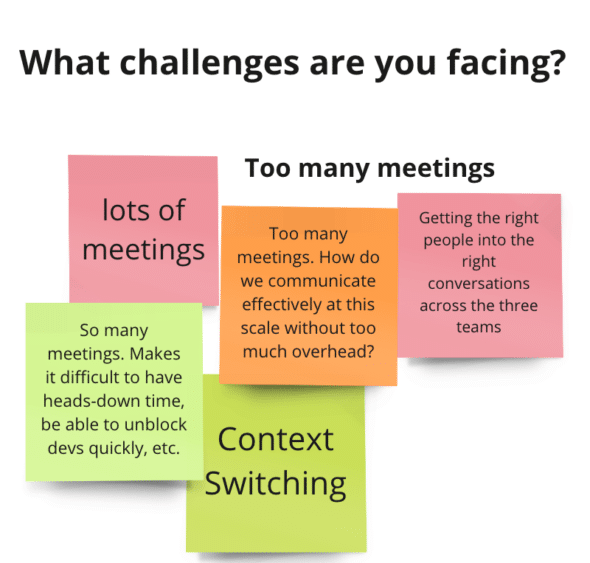Article summary
In a recent sprint retrospective, our development and design team unanimously flagged “too many meetings” as the number one thing to fix. (I’m guessing you are nodding in agreement as you read this.) The quality of the meetings wasn’t an issue. By that, I mean the team was satisfied with the length, structure, and outcome. But the frequency of those meetings was “keeping us from doing our work.”
Challenges

As a Delivery Lead, I usually am the one calling for all of these (dreadful?) team meetings. At the same time, I am focused on the team’s productivity as measured by the features we deliver. So, I give careful thought to whether we can accomplish what’s needed using asynchronous communication.
I realize there’s a tradeoff between pulling people from their project work and the reasons for convening meetings. What I find is that the most important work happening on our team occurs in meetings.
In “Meetings *are* the work” Elizabeth Ayer asks, “What if the reason we can’t seem to fix meetings is that we’re mischaracterizing ‘the work’ in the first place?” Maybe we need a collective shift in how we think about spending time in project meetings.
5 Reasons Meetings Are Important Work
On software project teams, meetings are a critical component of product development. Below are five benefits that should change how we perceive their importance.
Goal Alignment
Meetings can save time and improve productivity by ensuring everyone is aligned on priorities and working towards common goals. On our project, we spend time in meetings aligning with our client’s feature roadmap. They add new items to their roadmap, and priorities change regularly. For our project team to be focused on delivering the right features, we need to ensure the entire team knows what is on the roadmap.
Action Planning
Meetings provide an opportunity to develop an organized action plan for the entire group. They ensure everyone is on the same page and understands the objectives and expectations.
Enhancing Accountability
Meetings can help establish accountability and ensure that team members are responsible for their tasks and deadlines. Ours is a distributed team with competing priorities. To deliver complex feature sets, individuals on our teams must pair with each other to improve velocity. We often find ourselves convening meetings to figure out who is doing what and when.
Encouraging Creativity and Innovation
Meetings can be a great forum for generating new ideas and encouraging innovation. Our team uses meetings to help them discover new ways of delivering complex feature sets under tight deadlines.
Bonding
Meetings provide an opportunity to build relationships and strengthen bonds between team members. They can help create a sense of camaraderie and foster a team spirit. This is particularly important for my team because we have several remote members. Also, we are part of our client’s distributed development teams. Without virtual meetings, we would not have had the opportunity to see each other.
Meetings as Opportunities
Meetings have a bad reputation for being unproductive and time-consuming. Many people dread the idea of sitting through yet another meeting the team could have easily handled via Slack or via email. However, it’s time to change our mindset about meetings. We should see them as valuable opportunities to align on goals, create action plans, establish accountability, generate ideas, and strengthen bonds.

